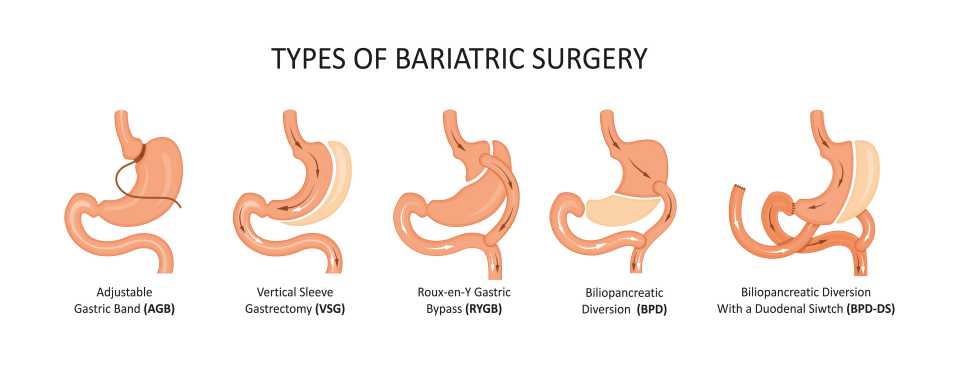Bariatric surgery, also referred to as weight loss surgery, has emerged as a life-altering option for those battling obesity. This surgical procedure reduces the size of the stomach, thereby limiting the quantity of food a person can consume and resulting in substantial weight loss.
The benefits of bariatric surgery go far beyond just weight loss, however. The surgery can also help to improve or even resolve a range of health conditions, including type 2 diabetes, high blood pressure, and sleep apnea. Bariatric surgery may be the answer for those who are sick and tired of dealing with their weight and are finally ready to make a difference.
What is Bariatric Surgery?
By altering the anatomy of the digestive system, bariatric surgery aids weight loss. It reduces the size of the stomach, which helps to limit the amount of food a person can eat and leads to significant weight loss.
The surgery also alters how our body processes food, reducing calorie absorption. When combined with appropriate lifestyle adjustments, it can help people lose a lot of weight and improve their health.
Benefits of Bariatric Surgery
Bariatric surgery has several advantages besides just helping people lose weight. Several medical issues, such as type 2 diabetes, hypertension, and sleep apnea, have been shown to respond well to bariatric surgery.
Reduced risk of cardiovascular disease, stroke, and some forms of cancer are additional benefits of bariatric surgery. Bariatric surgery patients report improved quality of life, reduced joint pain, and increased mobility. The surgery can also help to improve mental health, as patients report feeling more confident and less anxious.
Types of Bariatric Surgery
The choice of bariatric surgery depends on the patient’s general health, weight, and personal preferences. The most commonly performed bariatric surgeries are gastric bypass, sleeve gastrectomy, and adjustable gastric banding. In gastric bypass surgery, a tiny stomach pouch is formed, and the small intestine is rerouted to the pouch.
Surgeons perform sleeve gastrectomy to generate a stomach pouch that is smaller in size. In order to generate a smaller stomach pouch, an adjustable gastric band is inflated and placed around the patient’s stomach. Each surgery has its benefits and risks; patients should discuss their options with their doctor.

Risks and Complications
Like any surgery, it has risks and potential complications. The risks include bleeding, infection, blood clots, and reactions to anesthesia. Long-term complications may include malnutrition, bowel obstruction, and hernias.
Patients undergoing bariatric surgery must follow a strict diet and exercise plan to minimize the risks and complications. Regular follow-ups with their medical team are also essential to monitor their overall health and adjust their treatment plan if necessary.
Preparing for Bariatric Surgery
Patients considering bariatric surgery should first be thoroughly evaluated to establish their suitability for the procedure. A full medical history and physical, along with psychological and nutritional testing, are all part of the screening process.
Patients must also make lifestyle changes to prepare for surgery, such as quitting smoking, maintaining a healthy diet, and exercising regularly. Patients need to follow a preoperative diet to reduce the size of the liver, making the surgery safer and more comfortable.
Maintaining weight loss through healthy lifestyle changes
Maintaining weight reduction and bettering health following bariatric surgery requires people to make substantial modifications to their daily routines. Patients must follow a strict diet plan, including small and frequent meals, high-protein foods, and avoiding high-calorie foods and drinks.
Patients also need to exercise regularly to lose weight and improve their overall health. Regular follow-up visits with their medical team are essential to monitor their overall health and adjust their treatment plan if necessary.
Maintaining weight loss and better health after bariatric surgery requires dedication to a new way of life. Patients need to follow a healthy diet plan, including foods low in fat, sugar, and calories. Patients must also exercise regularly, including cardio and strength training, to burn calories and build muscle.
Staying hydrated is essential by drinking plenty of water and avoiding sugary drinks. Patients must also avoid smoking and excessive alcohol consumption, which can sabotage their weight loss efforts.
Success stories
Bariatric surgery has transformed many people’s lives, leading to significant weight loss and improved overall health. Many patients report improved self-esteem, increased energy, and reduced joint pain. Patients have reported that they can participate in activities they never thought possible, such as hiking, biking, and running. It has helped patients achieve their weight loss goals and improve their overall quality of life.
Related Article: Deviated Septum Surgery
